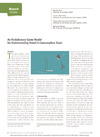Identificador persistente para citar o vincular este elemento:
https://accedacris.ulpgc.es/jspui/handle/10553/107085
| Título: | An evolutionary game model for understanding fraud in consumption taxes [Research Frontier] | Autores/as: | Chica, Manuel Hernández Guerra, Juan María Manrique De Lara Peñate, Casiano Chiong, Raymond |
Clasificación UNESCO: | 530202 Modelos econométricos 530101 Política fiscal y deuda pública |
Palabras clave: | Tax compilance Value added tax Game models Subjective probability |
Fecha de publicación: | 2021 | Publicación seriada: | IEEE Computational Intelligence Magazine | Resumen: | This paper presents a computational evolutionary game model to study and understand fraud dynamics in the consumption tax system. Players are cooperators if they correctly declare their value added tax (VAT), and are defectors otherwise. Each player's payoff is influenced by the amount evaded and the subjective probability of being inspected by tax authorities. Since transactions between companies must be declared by both the buyer and seller, a strategy adopted by one influences the other?s payoff. We study the model with a wellmixed population and different scalefree networks. Model parameters were calibrated using real-world data of VAT declarations by businesses registered in the Canary Islands region of Spain. We analyzed several scenarios of audit probabilities for high and low transactions and their prevalence in the population, as well as social rewards and penalties to find the most efficient policy to increase the proportion of cooperators. Two major insights were found. First, increasing the subjective audit probability for low transactions is more efficient than increasing this probability for high transactions. Second, favoring social rewards for cooperators or alternative penalties for defectors can be effective policies, but their success depends on the distribution of the audit probability for low and high transactions. | URI: | https://accedacris.ulpgc.es/handle/10553/107085 | ISSN: | 1556-603X | DOI: | 10.1109/MCI.2021.3061878 | Fuente: | IEEE Computational Intelligence Magazine [ISSN 1556-603X], v. 16 (2), p. 62-76, (Mayo 2021) |
| Colección: | Artículos |
Citas SCOPUSTM
15
actualizado el 08-jun-2025
Citas de WEB OF SCIENCETM
Citations
14
actualizado el 12-ene-2026
Visitas
169
actualizado el 30-nov-2024
Descargas
272
actualizado el 30-nov-2024
Google ScholarTM
Verifica
Altmetric
Comparte
Exporta metadatos
Los elementos en ULPGC accedaCRIS están protegidos por derechos de autor con todos los derechos reservados, a menos que se indique lo contrario.
